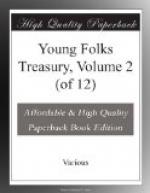Robin was no longer called Robin of Huntingdon, but Robin of Sherwood Forest. Very soon people shortened Sherwood into Hood, though some people say he was called Hood from the green hoods he and his men wore. How he came to have his name does not matter very much. People almost forgot that he was really an earl, and he became known, not only all over England, but in many far countries, as Robin Hood.
Robin was captain of the band of Merry Men. Next to him came Little John. He was called Little John because he was so tall, just as Midge the miller’s son was called Much because he was so small.
Robin loved Little John best of all his friends. Little John loved Robin better than any one else in all the world. Yet the first time they met they fought and knocked each other about dreadfully.
“How they came acquainted, I’ll
tell you in brief,
If you will but listen
a while;
For this very jest, among all the
rest,
I think it may cause
you to smile.”
It happened on a bright sunshiny day in early spring. All through the winter Robin and his men had had a very dull time. Nearly all their fun and adventures happened with people traveling through the forest. As there were no trains, people had to travel on horseback. In winter the roads were bad, and the weather so cold and wet, that most people stayed at home. So it was rather a quiet time for Robin and his men. They lived in great caves during the winter, and spent their time making stores of bows and arrows, and mending their boots and clothes.
This bright sunshiny morning Robin felt dull and restless, so he took his bow and arrows, and started off through the forest in search of adventure.
He wandered on for some time without meeting any one. Presently he came to a river. It was wide and deep, swollen by the winter rains. It was crossed by a very slender, shaky bridge, so narrow, that if two people tried to pass each other on it, one would certainly fall into the water.
Robin began to cross the bridge, before he noticed that a great, tall man, the very tallest man he had ever seen, was crossing too from the other side.
“Go back and wait until I have come over,” he called out as soon as he noticed the stranger.
The stranger laughed, and called out in reply, “I have as good a right to the bridge as you. You can go back till I get across.”
This made Robin very angry. He was so accustomed to being obeyed that he was very much astonished too. Between anger and astonishment he hardly knew what he did.
He drew an arrow from his quiver, and fitting it to his bow, called out again, “If you don’t go back I’ll shoot.”
“If you do, I’ll beat you till you are black and blue,” replied the stranger.
“Quoth bold Robin Hood, ’Thou
dost prate like an ass,
For, were I to bend my bow,
I could send a dart quite through thy
proud heart,
Before thou couldst strike
a blow.’”




